Germany 1-0 England: 'Defeat - but a display laced with promise for England'
- Published
Southgate 'very pleased' despite defeat
Gareth Southgate's first game as permanent England manager, following a four-game spell in interim charge, ended in defeat - but it was a loss with honour here in Germany.
The 46-year-old is charged with shaping the new era that was meant to be Sam Allardyce's province, but which ended after one World Cup qualifying win in Slovakia when the now Crystal Palace manager was caught in a newspaper sting.
Southgate ended his run in temporary charge undefeated, but this was the start of the serious business as he prepares his plans to take England to the World Cup in Russia next year.
So what can be taken from the 1-0 loss in Dortmund's magnificent Signal Iduna Park before Sunday's World Cup qualifier against Lithuania at Wembley?
Can Southgate end 'island' mentality?
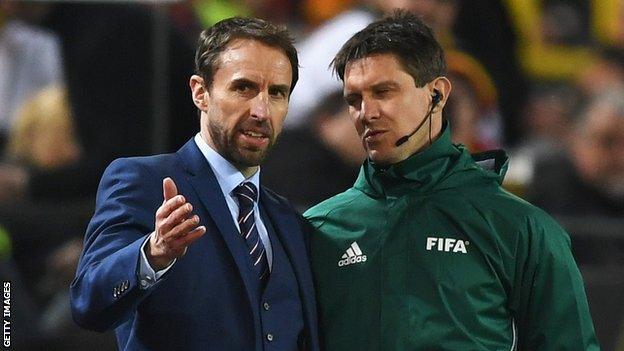
Gareth Southgate played 57 times for England
Southgate has cut an impressive figure in his early days as England manager, and certainly here in Germany. He was calm and measured throughout, firm in what he demanded in his pre-match media briefing in Essen and cautiously optimistic post-match in Dortmund.
His insistence England must "get off the island" in a football context struck a chord, and it is clear he wants to embrace tactical flexibility and the factors that have made so-called rivals so much more successful.
He experimented with a three-man defensive system England last used in defeat by Croatia in October 2006, a 2-0 loss that exposed the first cracks in the Steve McClaren regime.
Southgate chanced his arm in circumstances that suited experimentation - this was effectively a testimonial for Germany striker Lukas Podolski, who scored the winner on a night when he was lavishly feted before, during and after (seemingly endlessly) by the home fans.
And, while placing it in this context, it worked well enough and integrated the excellent Michael Keane to such an extent it certainly gave Southgate food for thought.
To add extra lustre to this new era of open, non-island thought from Southgate and the Football Association, it was announced before kick-off that a memorandum of understanding has been signed with the DFB, German football's governing body, to share ideas about coaching, youth development and administration.
It was signed by FA chairman Greg Clarke and chief executive Martin Glenn in Dortmund and will run for two years, with DFB president Reinhard Grindel saying: "Both parties have a tremendous amount of expertise and it only makes sense to connect and share this knowledge."
Cynics may suggest World Cup holders Germany's record of regular success, consistent excellence and history of developing world-class young players makes this potentially a very one-sided arrangement.
What is does mean is the FA and Southgate flew out of Germany with tangible evidence of the determination to embrace a wider culture and a performance that at least illustrated the new manager's willingness to carry it through.
Southgate accentuates the positives
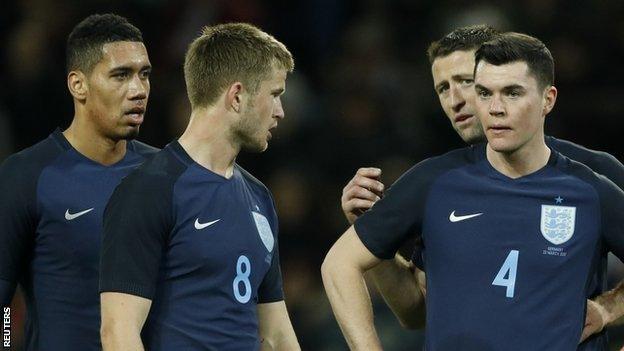
Michael Keane (number four) impressed on his England debut
And so he would, say those used to the years of under-achievement, unfulfilled promise and now the acceptance of England as a strictly second-tier football power following the embarrassment of defeat by Iceland in the last 16 at Euro 2016 that led to Roy Hodgson's resignation as manager.
The debacle of Allardyce's 67-day reign only increased the feeling that England, as a football nation, was born under a bad sign.
Southgate has to start somewhere and, even though this was his first defeat, he was well within his rights to suggest there were at least some shoots of recovery.
He proved he is prepared to extend his net beyond the established order with the selection of Burnley's Keane, who did so well in testing circumstances, and West Bromwich Albion's Jake Livermore, who may not have been as eye-catching but did himself no harm.
England's performance must be framed by the fact they were playing a second-string Germany who were effectively staging a testimonial for Podolski and rarely went through the gears - but it was still a display laced with promise.
Tottenham midfielder Dele Alli confirmed he has all the tools to be an international player while Liverpool's Adam Lallana demonstrated the energy and creation that now makes him an automatic choice for England.
Yes, England lost, but there was enough to suggest Southgate and his players deserved a break from negative reflection on this 90 minutes.
And the positives don't end there...
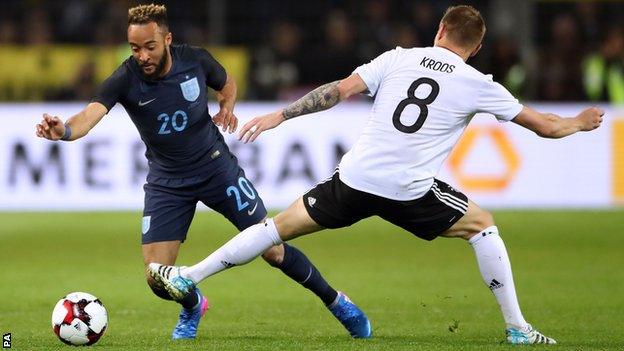
Nathan Redmond made his England debut in Dortmund
England were missing key players who will improve them, and give Southgate even further room for optimism.
Tottenham striker Harry Kane was a very obvious absentee from the squad to face Germany and Lithuania, perhaps more significantly than England's all-time record goalscorer Wayne Rooney, with the sense growing that the Manchester United man's international career is more or less over.
Kane, sidelined with an ankle injury, has 19 Premier League goals this season and, while he has had a dip in form at international level, the 23-year-old has the quality to be a centrepiece for Southgate for years to come.
Liverpool captain Jordan Henderson will add his growing authority to midfield when fit, while Tottenham's Danny Rose has matured at left-back.
Elsewhere, Manchester United teenager Marcus Rashford, who featured briefly in Dortmund, is a shining light for the future in attack while Southampton's James Ward-Prowse and Nathan Redmond got a taste of the action on their debuts on Wednesday.
John Stones only emerged in the final seconds but most shrewd judges see the Manchester City defender, still only 22, as a fixture in England's defence for years to come.
Everton's Ross Barkley is in the form of his life at 23 after some big-stick cajoling from manager Ronald Koeman, and even 22-year-old Raheem Sterling's fiercest critics accept he is improving under Pep Guardiola at Manchester City.
It is the hope that has made life such a misery for England before - but Southgate was right to fly out of Dortmund in optimistic mood.
Will Rooney get the Podolski treatment?
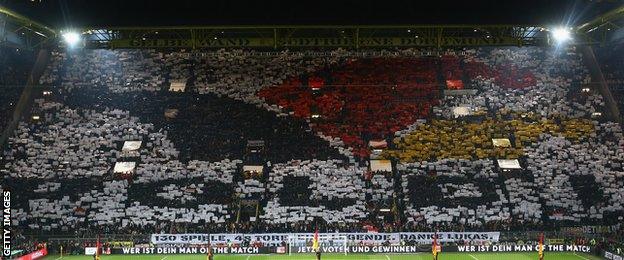
Germany fans paid tribute to 'Poldi' before Wednesday's match
Podolski scored his 49th goal for Germany, in his 130th and last appearance. This whole night was dedicated to this hugely popular and fun-loving 31-year-old.
He gave a speech before the game that delayed the kick-off as a mosaic was formed in his honour at one end of the ground and, after scoring the winner, he departed to a standing ovation and the music from Gladiator.
At the final whistle, he was joined by his Germany team-mates in a celebration of his career before embarking on a lap of honour that seemed to end when only stewards and those others in place to keep order were left.
Podolski's farewell was loud, long, heartfelt and a tribute to a player who served his country so well, including in Germany's World Cup win in 2014.
It was brilliantly stage-managed to pay full tribute - so will Rooney get something along similar lines from the FA and England?
His England career may yet be over. Who knows? But, if he comes back, can he expect the Podolski treatment?
After all, Manchester United's all-time record goalscorer has a better record than Podolski. He is also 31, and his 53 goals in 119 games for England mean he has eclipsed the great Sir Bobby Charlton for club and country.
Rooney, out injured, was restricted to sending a "good luck", external message to his England colleagues, and he has been given no guarantees by Southgate either as player or captain.
Germany and the DFB gave Podolski the most spectacular send-off, and he left the field to a prolonged standing ovation.
But will Rooney get the same treatment, or even the chance to say goodbye, after an England career that stretches back to his debut against Australia aged just 17 years and 111 days?
- Published23 March 2017
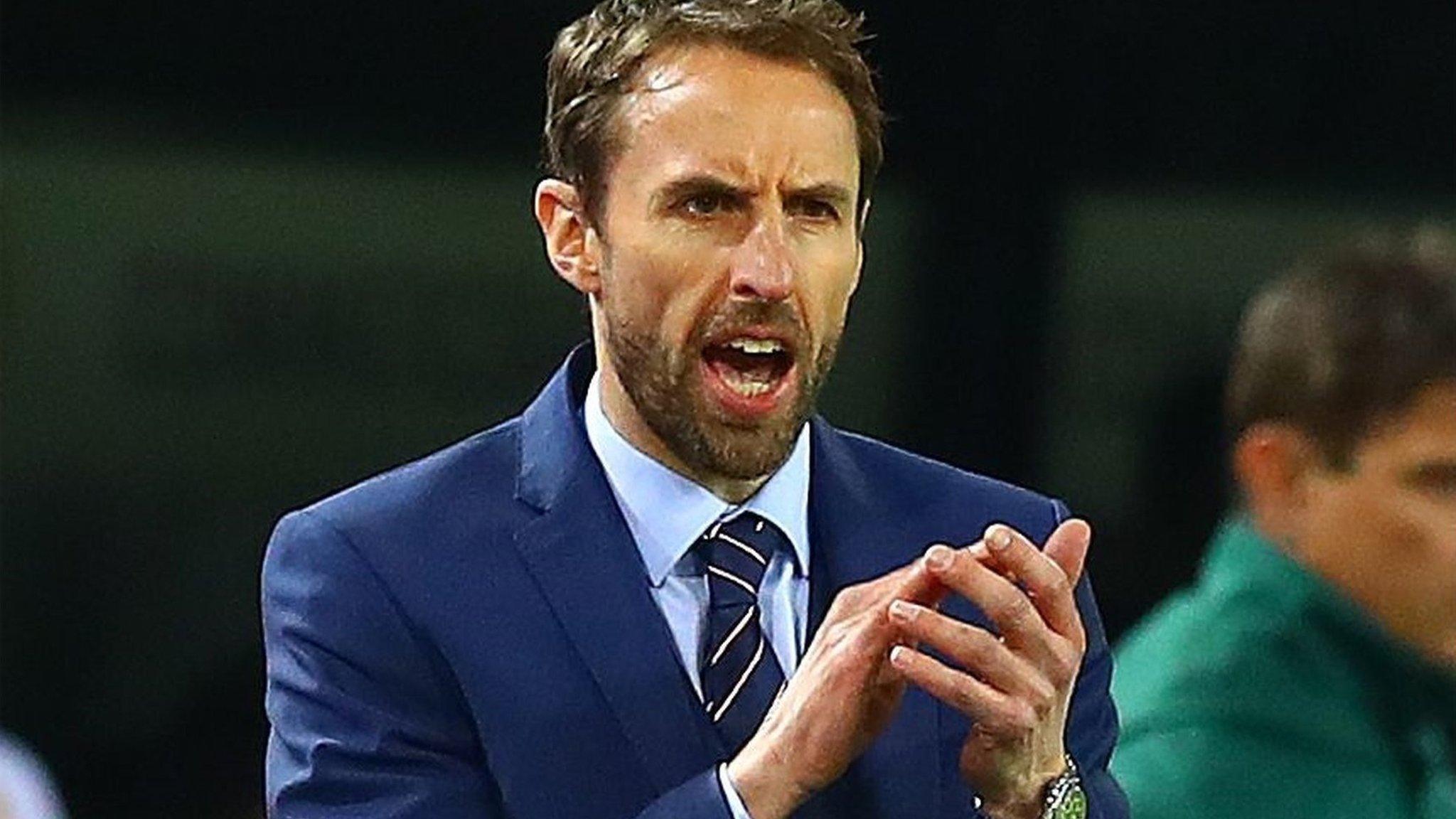
- Published22 March 2017
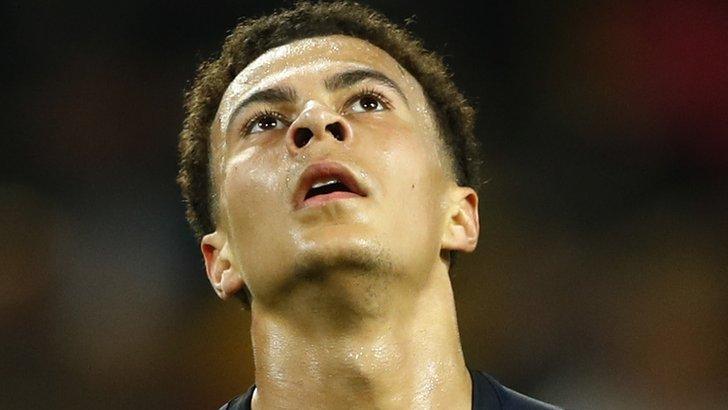
- Published21 March 2017
